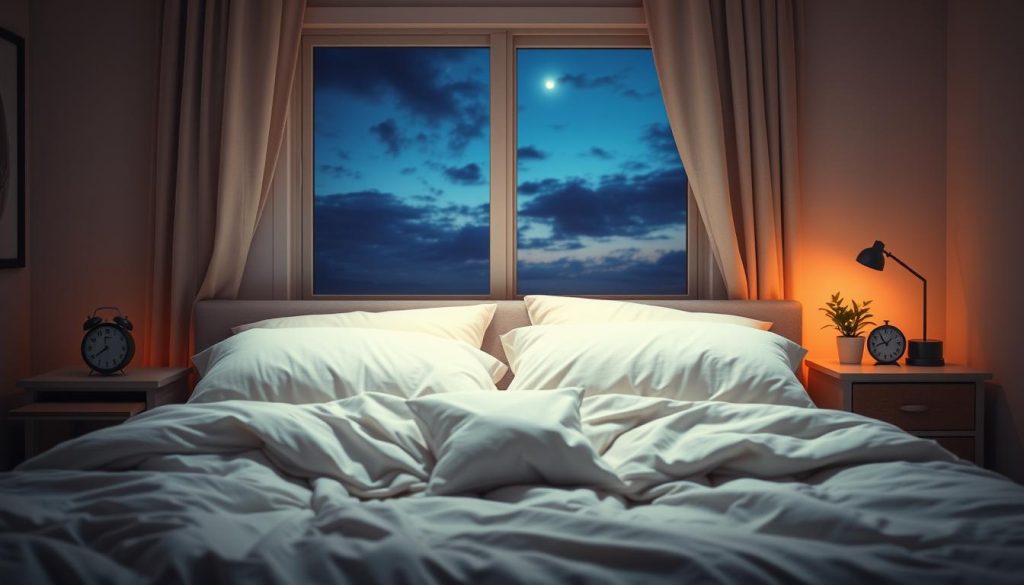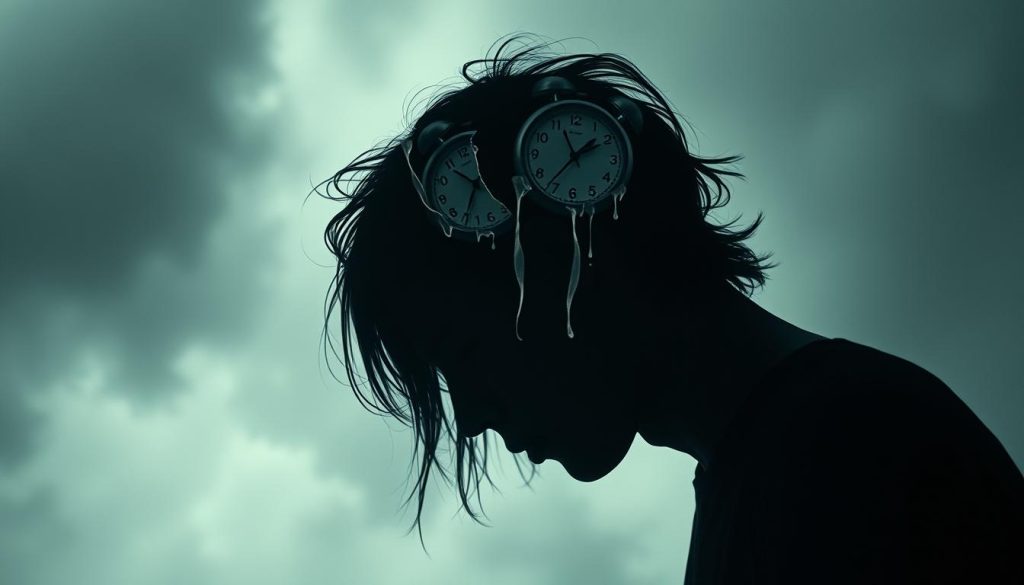Sleep is a basic need for humans, but many struggle to get enough. This guide will cover sleep deprivation’s causes and effects. You’ll learn how to better your sleep habits and overall health.
Sleep deprivation is common and affects millions. It can harm our thinking and increase health risks. Knowing the causes and effects helps us improve our sleep and health.
We’ll look at what sleep deprivation is and why it happens. We’ll also talk about its physical, mental, and emotional effects. Plus, we’ll share tips to help you sleep better and live a better life.
What is Sleep Deprivation?
Sleep deprivation is when people don’t get enough sleep. It’s a big problem for many. It can hurt both body and mind.
Definition and Symptoms of Insufficient Sleep
Sleep deprivation happens when we don’t sleep enough. Adults need 7-9 hours each night. Signs include:
- Fatigue and daytime drowsiness
- Difficulty concentrating and staying focused
- Irritability and mood changes
- Impaired cognitive function and decision-making
- Weakened immune system
The Importance of Sleep for Overall Health
Sleep is key for health. It helps our bodies fix tissues and balance hormones. It also helps us remember things.
Good sleep keeps our minds sharp and our moods stable. Without enough sleep, we face many health problems. These include obesity, heart disease, and diabetes.
| Condition | Impact |
|---|---|
| Obesity | Insufficient sleep can disrupt the hormones that regulate appetite, leading to weight gain. |
| Cardiovascular disease | Sleep deprivation is associated with an increased risk of high blood pressure, heart disease, and stroke. |
| Diabetes | Lack of sleep can impair insulin regulation and glucose metabolism, increasing the risk of type 2 diabetes. |
Understanding sleep helps us see its importance. It’s vital for our health and happiness.

Causes of Sleep Deprivation
It’s important to know why we don’t sleep well. Our fast-paced, tech-filled lives play a big role. This lifestyle can make it hard to get good sleep.
Lifestyle Factors Contributing to Poor Sleep
Here are some lifestyle habits that can hurt our sleep:
- Work schedules: Long hours and irregular shifts can mess up our sleep patterns. This makes it hard to get 7-9 hours of sleep each night.
- Stress and anxiety: Worrying too much, money troubles, and emotional stress can keep us awake. This is because our body’s stress response is always on.
- Technology use: Devices like phones and computers give off blue light. This light can stop our body from making melatonin, the sleep hormone.
- Poor sleep habits: Going to bed at different times and having a bad sleep environment can also hurt our sleep. This includes uncomfortable beds, too much noise, or bright lights.
Knowing these reasons for poor sleep helps us fix the problems. We can then improve our sleep quality.
Sleep Deprivation
Sleep deprivation can lead to chronic insomnia and sleep disorders. These issues affect both physical and mental health. It’s important to understand how sleep deprivation causes these problems.
Chronic Insomnia and Sleep Disorders
Chronic insomnia makes it hard to fall or stay asleep. It can cause fatigue, poor thinking, and mental health issues like depression and anxiety.
Sleep deprivation also causes other sleep disorders. These include sleep apnea, restless leg syndrome, and narcolepsy. These conditions disrupt sleep and worsen the effects of not getting enough sleep.
- Chronic insomnia
- Sleep apnea
- Restless leg syndrome
- Narcolepsy
If you have ongoing sleep problems, see a healthcare professional. They can find the cause and create a treatment plan for you.

Physical Effects of Lack of Sleep
Sleep is key to our health. Not getting enough sleep can harm our bodies. It can mess with our brains, make us perform worse, and even hurt our health in the long run.
Impact on Cognitive Function and Performance
Not sleeping enough hurts our brains. Our brains can’t work well without enough rest. We might find it hard to focus, remember things, and make good choices.
This brain trouble affects how well we do things. It’s not just at work or school. It’s in our everyday lives too.
Research shows one bad night of sleep can slow us down. It makes it harder to learn new things and increases mistakes. Not sleeping well over time can make our brains get worse. This can hurt our success and how well we do things.
| Cognitive Function | Impact of Sleep Deprivation |
|---|---|
| Attention and Focus | Decreased ability to concentrate and stay on task |
| Memory | Reduced ability to form new memories and recall information |
| Decision-Making | Impaired judgment and problem-solving skills |
| Creativity | Diminished ability to think innovatively and generate new ideas |
Knowing how sleep affects our brains helps us see why sleep is so important. We should make sleep a priority. Our bodies and minds need it to do well.

Mental and Emotional Consequences
Sleep deprivation can deeply affect our mental and emotional health. Not getting enough sleep makes us more prone to mood disorders like anxiety and depression. The emotional toll of not sleeping enough is huge.
Many studies show sleep-deprived people often feel depressed and anxious. Without enough sleep, our brains struggle to control emotions and stay positive. This can cause irritability, mood swings, and trouble handling stress.
Also, sleep deprivation can hurt our thinking skills. It makes it hard to focus, make decisions, and solve problems. This can affect our work, school, and personal life, adding to our emotional pain.
To stay well, we must value getting enough, good sleep. By fixing sleep problems and improving our sleep habits, we can lessen these mental and emotional issues. This helps us live a healthier, more balanced life.
Strategies for Improving Sleep Quality
Getting quality sleep is key for our health. There are many ways to improve our sleep. One important step is to keep a regular sleep schedule. This means going to bed and waking up at the same time every day.
This helps our body’s clock stay in sync. It leads to better sleep patterns.
Our bedroom should be dark, quiet, and cool for good sleep. These conditions help us sleep deeper and more restfully. It’s also good to avoid using electronic devices in the bedroom.
Doing relaxation techniques before bed can also help. This includes deep breathing or light yoga. These activities help us relax and get ready for sleep.
By following these tips for better sleep, sleep hygiene practices, and sleep improvement techniques, we can improve our sleep. A well-rested person can handle daily life better. They are stronger physically and mentally.

